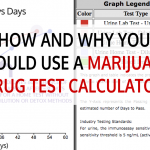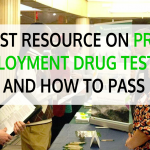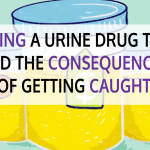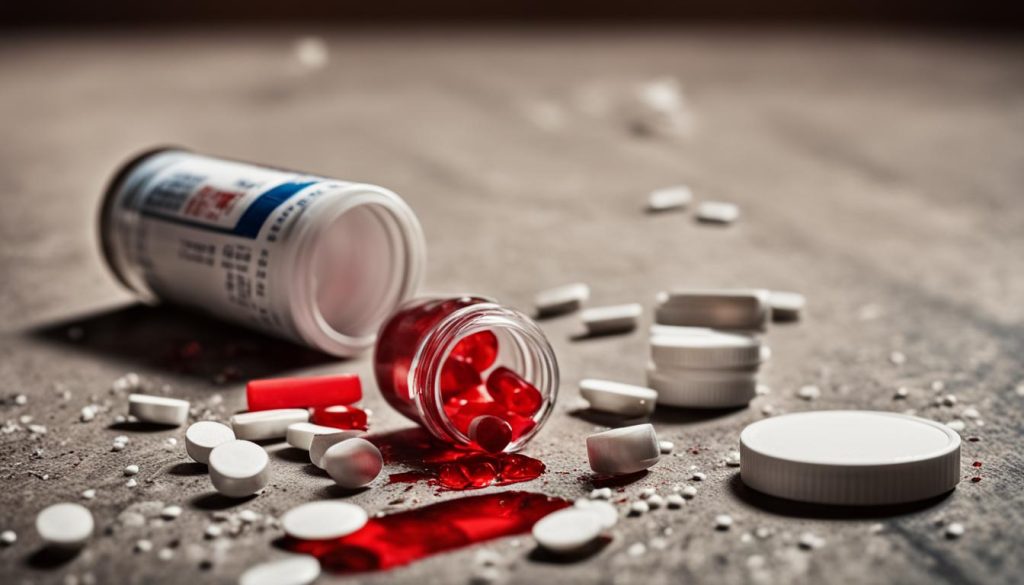
Greetings, dear readers! Today, we delve into an important topic that affects many individuals – failed drug tests. In this article, we will explore the common factors that can contribute to a failed drug test and shed light on the impact of medications such as Ibuprofen. Understanding these factors is crucial for anyone undergoing drug testing, whether it be for employment, athletics, or personal reasons.
Key Takeaways:
- Drug tests can yield false positive results, leading to a failed drug test.
- Common factors that contribute to false positives include medications and certain foods.
- Ibuprofen, an over-the-counter drug, is one medication that can trigger a false positive result.
- Poppy seeds and hemp seeds are foods that can cause false positive results on drug tests.
- Accurate drug testing requires proper sample collection, consideration of hydration levels, and individual metabolic profiles.
Understanding Drug Testing and False Positives
Drug testing is a vital tool in screening individuals for the presence of drugs. However, false positive results can sometimes occur, causing confusion and potential harm. It is important to have a clear understanding of the drug testing process and the factors that can contribute to false positives.
False positive results occur when a drug test indicates the presence of a drug when the individual has not actually used it. These false positives can be caused by a variety of factors, including medications, foods, and the drug screening process itself.
The drug screening process typically involves multiple steps, such as sample collection, testing, and analysis. During sample collection, it is important to follow proper procedures to minimize the risk of contamination or tampering. Any deviations from these procedures can potentially lead to inaccurate results.
Medications, both prescription and over-the-counter, can also contribute to false positive results. Some medications may contain substances that mimic the presence of drugs in the body, leading to a positive result on a drug test. It is crucial to communicate any medications being taken to the testing lab to ensure accurate interpretation of the results.
Factors Affecting False Positives
Additionally, certain foods can also impact drug test results. For example, poppy seeds have been known to cause false positives for opioids, while hemp seeds may show evidence of marijuana use. It is important to be mindful of the foods consumed prior to drug testing to avoid any unnecessary complications.
Understanding the factors that can lead to false positive results is crucial for accurate drug testing. It ensures that individuals are not wrongly accused of drug use and helps maintain the integrity of the testing process. By being aware of medications, foods, and other factors that can impact drug test results, we can work towards improving the accuracy and reliability of drug testing procedures.
| Factors Affecting False Positive Results | Examples |
|---|---|
| Medications | Antidepressants, antipsychotics, antibiotics |
| Foods | Poppy seeds, hemp seeds |
| Sample Collection | Contamination, tampering |
| Testing Process | Procedural errors |
In Conclusion
Drug testing and the detection of illicit substances play a crucial role in various industries, including employment, sports, and law enforcement. However, false positive results can have serious consequences for individuals, leading to undeserved penalties and damaged reputations. By understanding the drug testing process and the factors that can contribute to false positives, we can work towards improving the accuracy and fairness of drug testing procedures.
Medications That Can Trigger False Positive Results
When it comes to drug tests, certain medications can lead to false positive results. It’s important to be aware of the potential impact of these medications to ensure accurate testing and avoid any unnecessary consequences.
Over-the-counter drugs are among the medications that can trigger false positive results. One example is Ibuprofen, a common pain reliever. Although Ibuprofen is widely used and easily accessible, it can cause a false positive for marijuana on a drug test. This is because some drug tests are not able to differentiate between marijuana and certain compounds found in Ibuprofen.
Prescription medications can also contribute to false positive results. Some antidepressants and antipsychotics have been known to cause false positives for substances such as amphetamines or opioids. It’s crucial to disclose any prescription medications you are taking to the testing lab to ensure accurate interpretation of the results.
| Medication | False Positive |
|---|---|
| Ibuprofen | Marijuana |
| Antidepressants | Amphetamines or opioids |
| Antipsychotics | Amphetamines or opioids |
It’s important to note that false positive results can vary depending on the specific drug test being used. Some tests have a higher sensitivity and specificity, reducing the chances of false positives. However, it’s always best to err on the side of caution and disclose any medication use to the testing lab to ensure accurate results and avoid any unnecessary consequences.
Foods That Can Cause False Positive Results
When it comes to drug testing, it’s not just medications that can lead to false positive results. Certain foods can also cause inaccurate readings, potentially impacting an individual’s test results. It’s important to be aware of these food-related factors to ensure the accuracy of drug screening processes.
Poppy seeds are a prime example of a food that can cause false positive results on drug tests. These tiny seeds come from the same plant that produces opium, and they contain trace amounts of opiate alkaloids. Consuming poppy seeds, such as in bagels or muffins, can potentially lead to a positive drug test for opioids.
Hemp seeds are another food that can cause false positive results on drug tests. While hemp seeds themselves do not contain significant levels of THC (the psychoactive compound in marijuana), they can still contain small traces. These traces of THC can potentially result in a false positive for marijuana use.
Ingesting poppy seeds or consuming hemp seeds can lead to false positive results on drug tests.
To avoid potential false positives due to these foods, it’s important for individuals to be mindful of their consumption leading up to a drug test. If possible, it may be best to avoid these foods altogether in the days leading up to the test. Additionally, it’s crucial to communicate any known consumption of these foods to the testing lab, as they may be able to take that into account during the analysis process.
| Foods | Impact on Drug Test Results |
|---|---|
| Poppy seeds | Can lead to a false positive for opioids |
| Hemp seeds | Can result in a false positive for marijuana |
Factors Affecting the Accuracy of Drug Tests
When it comes to drug tests, accuracy is of utmost importance. Several factors can influence the accuracy of these tests, so it’s crucial to understand and consider them for reliable results. Let’s explore some key factors that can affect the accuracy of drug tests.
Sample Collection
The way in which samples are collected plays a significant role in the accuracy of drug tests. It’s essential to follow proper collection procedures to minimize the risk of contamination or tampering. A well-executed sample collection process ensures reliable results and maintains the integrity of the test.
Hydration Levels
Hydration levels can impact drug test accuracy, particularly in urine-based tests. Proper hydration helps ensure that the concentration of drugs or their metabolites in the urine is sufficient for detection. It’s important to note that excessive hydration might dilute the sample, potentially leading to false negatives. Striking a balance in hydration is key to obtaining accurate results.
Metabolic Profile
Individual metabolic profiles vary, and this can influence drug test accuracy. Different people metabolize drugs at different rates, which can affect the detection window of certain substances. It’s important to consider individual metabolic factors when interpreting drug test results, as they can impact the accuracy of the testing.
These factors highlight the importance of proper sample collection, considering hydration levels, and understanding individual metabolic profiles when conducting drug tests. By addressing these factors, we can improve the accuracy and reliability of drug testing procedures, ultimately ensuring more accurate results.
Specific Medications and False Positives
When it comes to drug testing, certain medications can lead to false positive results. It’s important to be aware of these potential interactions to avoid any confusion or misinterpretation of test results. The following specific medications have been found to cause false positives on drug tests:
- Antidepressants: Certain antidepressant medications, such as tricyclic antidepressants and selective serotonin reuptake inhibitors (SSRIs), can produce false positive results for amphetamines or LSD.
- Antipsychotics: Some antipsychotic medications, including phenothiazines and thioridazine, can lead to false positive results for amphetamines or opioids.
- Antibiotics: Although rare, some antibiotics, like rifampin and rifampicin, can cause false positive results for opioids or cannabinoids.
It’s important to note that false positives can occur due to the chemical similarities between certain medications and the substances being tested for. If you are taking any of these medications and undergo a drug test, be sure to inform the testing lab about your medication use to ensure accurate interpretation of the results.
“The use of specific medications can lead to false positive results on drug tests. It’s crucial to communicate any medication use to the testing lab to avoid any confusion or misinterpretation of the results.”
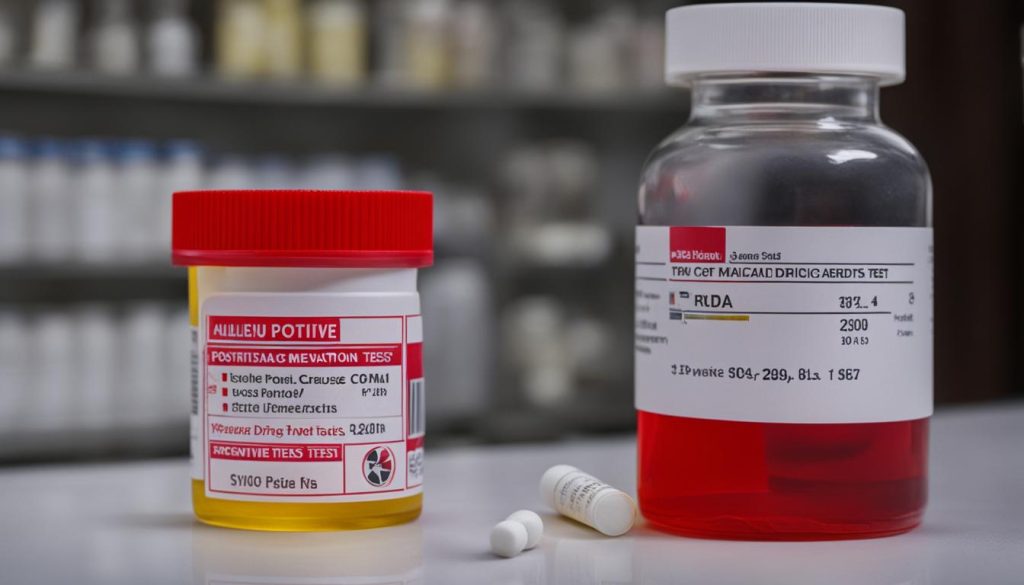
By understanding the potential interactions between specific medications and drug tests, individuals can take the necessary steps to ensure accurate and reliable results. It’s important to consult with healthcare professionals and testing experts to clarify any concerns or questions regarding medication use and drug testing. Together, we can strive for more accurate testing procedures and reliable results.
Impact of CBD and Hemp Products on Drug Tests
When it comes to drug tests, CBD and hemp products can have an impact on the results. While CBD itself is typically not detected on drug tests, it’s important to be aware that some hemp products may contain trace amounts of THC, which can result in a false positive for marijuana use. This is due to the fact that THC is the psychoactive compound found in marijuana that drug tests are designed to detect.
For individuals who use CBD or hemp products regularly, the risk of a false positive on a drug test is relatively low. However, it’s essential to consider the potential implications if you are subjected to drug testing. It’s recommended to inform the testing laboratory about your CBD or hemp product use to ensure accurate interpretation of the results.
It’s important to note that not all CBD and hemp products are created equal. The level of THC in these products can vary, so it’s crucial to choose reputable brands that provide third-party lab testing to verify the THC content. By selecting high-quality products and being mindful of THC levels, individuals can reduce the risk of a false positive on a drug test while still enjoying the potential benefits of CBD and hemp.
| Hemp Product | THC Content |
|---|---|
| Hemp Oil | May contain trace amounts of THC |
| CBD Isolate | THC-free |
| Full-spectrum CBD | May contain up to 0.3% THC |
It’s also worth noting that the use of CBD or hemp products should always be in compliance with local laws and regulations. While many states have legalized the use of these products, there are still locations where they may be restricted or illegal. Prior to using CBD or hemp products, it’s important to research and understand the laws in your specific jurisdiction.
Considerations for Oral Fluid and Hair Testing
When it comes to drug testing, oral fluid testing and hair testing offer unique advantages and considerations. These two methods of testing can provide valuable insights into an individual’s drug use history, but they also come with their own challenges and limitations.
Oral Fluid Testing:
Oral fluid testing, also known as saliva testing, is becoming increasingly popular due to its non-invasive nature and ease of sample collection. It involves collecting a saliva sample from the individual and testing it for the presence of drugs or their metabolites. However, it’s important to note that oral fluid testing has a shorter window of detection compared to other methods. Drugs may be detected in oral fluid for a shorter period of time compared to urine or hair, making it more suitable for detecting recent drug use.
One consideration when interpreting oral fluid test results is the potential for false positives. While oral fluid testing is highly accurate, there is a possibility of false positive results due to certain medications. It’s important to inform the testing laboratory of any medications being taken to ensure accurate interpretation of the results.
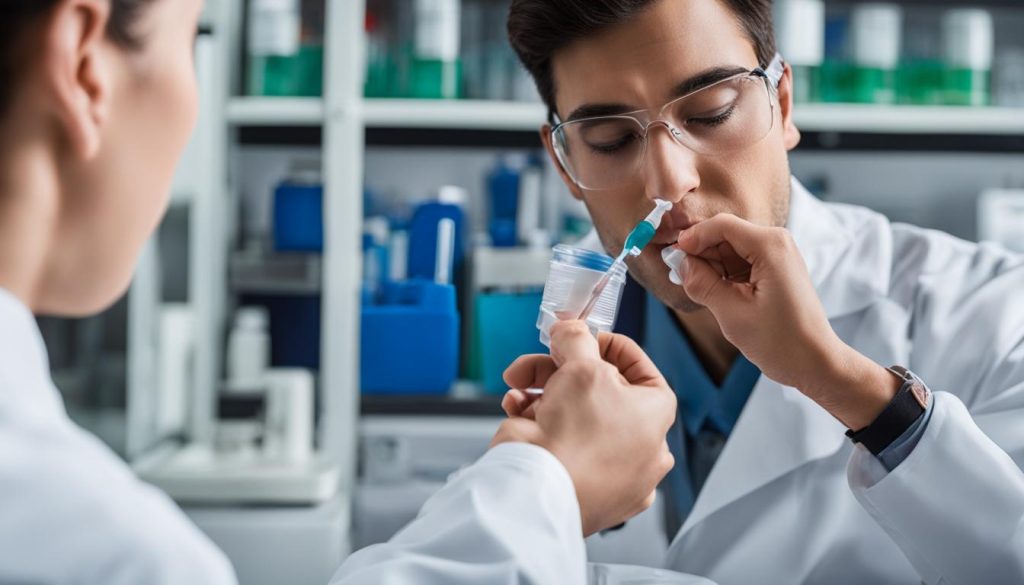
Hair Testing:
Hair testing is another method used for drug testing, offering a longer window of detection compared to other methods. Hair samples can provide a comprehensive history of drug use patterns, as drugs and their metabolites are incorporated into the hair follicle over time. This makes hair testing well-suited for detecting long-term drug use.
However, hair testing also has its limitations. External contamination, such as drug residues from environmental exposure, can potentially impact the accuracy of hair test results. Additionally, certain hair treatments or hair products may affect the interpretation of the test. It’s crucial to consider these factors when interpreting hair test results to ensure reliable and accurate information.
| Pros of Oral Fluid Testing | Cons of Oral Fluid Testing |
|---|---|
|
|
Importance of Lab Expertise and Interpretation
Accurate interpretation of drug test results relies heavily on the expertise of the lab conducting the analysis. Trained toxicologists possess the knowledge and skills required to navigate the complexities of drug testing, enabling them to provide valuable insight and analysis in determining the presence or absence of substances in a sample. Their expertise ensures that false positive results are minimized, and accurate conclusions can be drawn.
Lab professionals play a critical role in ruling out extenuating circumstances that may lead to false positives. They are well-versed in identifying potential interfering substances, considering factors such as cross-reactivity and metabolite formation that could impact the test results. By utilizing their expertise, labs can provide accurate and reliable information in drug testing.
Interpretation is another crucial aspect of drug testing, as it requires comprehensive analysis and understanding of the results. Trained professionals, such as toxicologists, employ their knowledge and experience to interpret the data accurately, taking into consideration various factors that may influence the outcome. This interpretation is crucial in avoiding false positive results and providing accurate information to the individuals or organizations relying on the test results.
When seeking drug testing services, it is essential to choose a reputable lab with experienced professionals. This ensures that the testing process is conducted with the highest level of expertise, minimizing the risk of false positive results. Lab expertise and interpretation are vital components of accurate drug testing, providing confidence in the reliability and validity of the results.
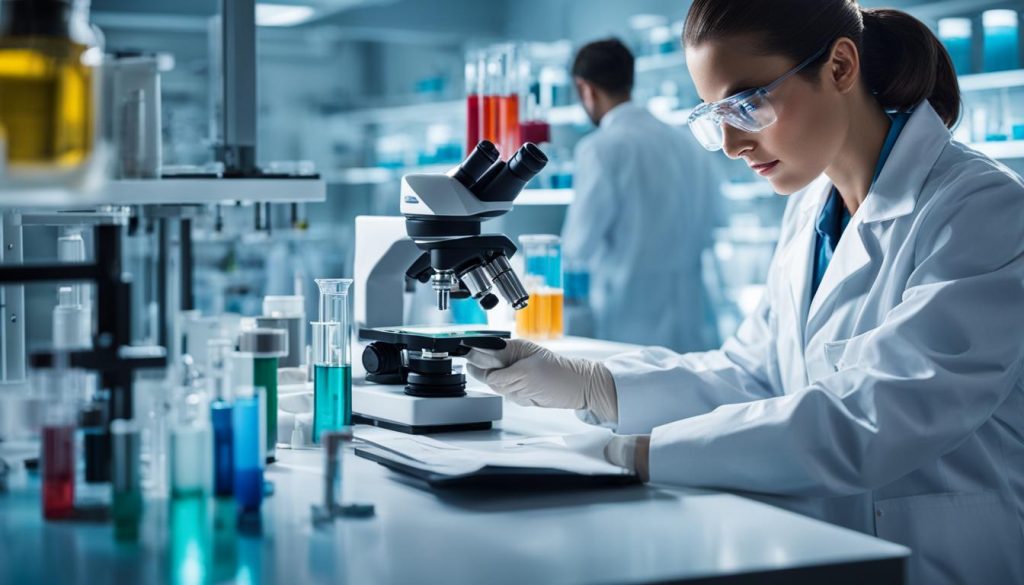
Table: Factors Influencing Lab Expertise and Interpretation
| Factor | Description |
|---|---|
| Training and Education | Lab professionals with extensive training and education in toxicology can offer superior expertise in drug testing. |
| Experience | Years of experience in conducting drug tests and interpreting results enhance a professional’s ability to accurately analyze samples and minimize false positives. |
| Continuing Education | Staying updated with the latest advancements in drug testing technology and methodologies ensures that lab professionals can adapt to emerging trends and challenges. |
| Laboratory Accreditation | Labs that have achieved accreditation from recognized organizations demonstrate their commitment to maintaining high standards and delivering accurate results. |
| Quality Control Measures | Implementing rigorous quality control measures in the laboratory, such as proficiency testing and internal audits, helps ensure accurate and reliable results. |
Conclusion
Drug testing is a critical practice in various settings, but it’s important to recognize that false positive results can occur. These false positives can be attributed to a variety of factors, including medications, foods, and individual physiological differences. Understanding these potential causes is vital for accurate and reliable drug screening.
Medications, both prescription and over-the-counter, can trigger false positive results on drug tests. It’s crucial to communicate any medications you’re taking to the testing lab to prevent misleading results. Additionally, certain foods, such as poppy seeds and hemp seeds, can also cause false positives. Being aware of the impact of these substances on drug test results is essential.
In order to achieve accurate drug testing, various factors must be considered. Proper sample collection and handling, along with maintaining chain of custody procedures, can ensure the integrity of the testing process. Additionally, individual factors like hydration levels and metabolic profiles can influence the accuracy of drug tests. Taking these factors into account is crucial for reliable results.
Ultimately, the accuracy of drug tests relies on the expertise and interpretation of the lab conducting the tests. Trained toxicologists play a vital role in ruling out extenuating circumstances and providing accurate analysis. Choosing a reputable lab with experienced professionals is crucial to avoid false positive results.
FAQ
Can Ibuprofen cause a false positive on a drug test?
Yes, Ibuprofen is one medication that can trigger a false positive result on a drug test.
Can certain foods cause false positive results on a drug test?
Yes, certain foods like poppy seeds and hemp seeds can lead to false positive results on drug tests.
What factors can affect the accuracy of drug tests?
Factors such as sample collection procedures, hydration levels, and individual metabolic profiles can impact the accuracy of drug test results.
Which medications can cause false positive results on drug tests?
Certain medications like antidepressants, antipsychotics, and certain antibiotics have been found to cause false positive results on drug tests.
Can CBD and hemp products result in false positive drug test results?
While CBD itself is not typically detected on drug tests, some hemp products may contain trace amounts of THC, which can lead to a false positive for marijuana use.
How do oral fluid testing and hair testing differ in terms of accuracy?
Oral fluid testing and hair testing have their own considerations, and factors like medications and external contamination can influence their accuracy.
How important is the expertise and interpretation of the lab conducting the drug test?
The expertise and interpretation of the lab conducting the drug test are crucial in avoiding false positive results. Trained toxicologists can provide valuable insight and analysis for accurate results.





